Routledge Philosophy GuideBook to
Kant
and the Critique of Pure Reason
Sebastian Gardners book is the best introduction to Kants masterpiece to have been written in over twenty years. This is a truly useful introduction for every reader of Kant that at the same time genuinely advances our understanding of the greatest of modem philosophers. I expect to recommend it for many years to come.
(Paul Guyer, University of Pennsylvania)
Gardners argument and analysis are carried out in a tough and vigorous way. Kant and the Critique of Pure Reason is valuable for students who want a clear story.
(Graham Bird, University of Manchester)
The Critique of Pure Reason is the cornerstone of Kants philosophical system and one of the greatest works in the history of Western philosophy. A proper understanding of the major philosophical developments of the last two hundred years from Hegel to Wittgenstein to Heidegger presupposes a knowledge of the Critique of Pure Reason.
Ideal for students coming to Kant for the first time, this GuideBook will be an invaluable guide to his epistemology and metaphysics.
Sebastian Gardner is Lecturer in Philosophy at University College London. He is the author of Irrationality and the Philosophy of Psychoanalysis.
 | Routledge
Philosophy
GuideBooks |
Edited by Tim Crane and Jonathan Wolff
University College London
Kant and the Critique of Pure Reason
Sebastian Gardner
Mill on Liberty
Jonathan Riley
Mill on Utilitarianism
Roger Crisp
Wittgenstein and the Philosophical Investigations
Marie McGinn
Heidegger and Being and Time
Stephen Mulhall
Plato and the Republic
Nickolas Pappas
Locke on Government
D. A. Lloyd Thomas
Locke on Human Understanding
E. J. Lowe
Spinoza and the Ethics
Genevieve Lloyd

Routledge Philosophy GuideBook to
Kant
and the Critique of Pure Reason
 Sebastian Gardner
Sebastian Gardner
First published 1999
by Routledge
2 Park Square, Milton Park,
Abingdon, Oxon, OX14 4RN
Simultaneously published in the
USA and Canada
by Routledge
270 Madison Ave,
New York NY 10016
Transferred to Digital Printing 2005
1999 Sebastian Gardner
All rights reserved. No part of this book may be reprinted or reproduced or utilised in any form or by any electronic, mechanical, or other means, now known or hereafter invented, including photocopying and recording, or in any information storage or retrieval system, without permission in writing from the publishers.
British Library Cataloguing in Publication Data
A catalogue record for this book is available from the British Library.
Library of Congress Cataloging in Publication Data
Gardner, Sebastian.
Kant and the Critique of pure reason / Sebastian Gardner.
p. cm. (Routledge philosophy guidebooks)
Includes biographical references and index.
1. Kant, Immanuel, 17241804. Kritik der reinen Vernunft. 2. Knowledge, Theory of. 3. Causation. 4. Reason.
I. Title. II. Series.
B2779.G27 1999 98-42339
121dc21
ISBN 0-415-11908-1 (hbk)
ISBN 0-415-11909-X (Pbk)
For my mother,
Jude, Euan and Benedict,
Emma, Bobby and Jade
We do not deny that the Kantian solution is extremely subtle and is perhaps balanced on the point of a needle, but who would believe that a solution to this problem could be found which was not alarmingly subtle?
(Gottfried Martin)
Transcendental idealism arises in general through a direct inversion of previous modes of philosophical explanation.
(F. W. J. von Schelling)
Contents
Preface
Kant published the Critique of Pure Reason (henceforth Critique) in two editions, and there are substantial differences between them. They are interlaced in the translation by N. Kemp Smith (2nd edn, London: Macmillan, 1933), where the A numbering in the margin refers to the first edition and the B numbering to the second, corresponding to the pagination of the German originals. Quotations in this book are taken from this edition, which has hitherto been standardly employed in English-language Kant commentary. Two new translations of the Critique have appeared very recently, the one by W. Pluhar (Indianapolis: Hackett, 1997), the other by P. Guyer and A. Wood (Cambridge: Cambridge University Press, 1998).
References are also made in this book to Kants Prolegomena to any Future Metaphysics (Proleg) (trans. J. Ellington, Indianapolis: Hackett, 1977), Critique of Practical Reason (CPracR) and Groundwork of the Metaphysics of Morals (Gr) (trans. and ed. M. Gregor, in Kant, Practical Philosophy, Cambridge: Cambridge University Press, 1996), Critique of Judgement (CJ) (trans. W. Pluhar, Indianapolis: Hackett, 1987) and his Philosophical Correspondence, 175999 (ed. and trans. A. Zweig, Chicago: University of Chicago Press, 1967). Where material from these works is quoted, it is taken from these editions, and all references are to the marginal pagination. The standard edition of Kants works in German is the Prussian Academy edition, Kants gesammelte Schriften, ed. Kniglich Preuischen Akademie der Wissenschaften (Berlin: Georg Reimer, subsequently Walter de Gruyter, 1900). References to this work are given in the form Ak followed by volume number and page number. Regarding Kantian terms such as First Analogy, fourth paralogism, capitals are used when referring to a section of the Critique, and lower case when referring to the argument given or discussed there.
It cannot be pretended that the prose of the Critique its colourless, dry, packing-paper style and stiff, abstract form, as the poet Heinrich Heine put it has many immediate attractions. Kant himself was acutely conscious of the works literary limitations, and excused it on the grounds that what it contains requires quite special technical expression. Kants philosophical vocabulary is baroque and unfamiliar. It does not strictly consist of neologisms, because the terms Kant employs are drawn from earlier philosophical sources and other (mathematical, juridical) quarters, but their meaning cannot be sought outside Kants texts. The only remedy for the difficulty presented by the style and terminology of the Critique is repeated exposure.
I should at the outset say something about the approach to Kant taken in this book, if only so that readers unfamiliar with the Critique and commentary on it should be made aware of how it differs from some of the many other approaches which may be taken.
The book reflects work, most of it in the last two decades, on Kants theoretical philosophy by Henry Allison, Karl Ameriks, Richard Aquila, Ermanno Bencivenga, Graham Bird, Gerd Buchdahl, Dieter Henrich, Arthur Melnick, Robert Pippin, Ralph Walker, Wayne Waxman and others. These writers do not express a single view of Kant by any means, but they share an outlook to the extent of agreeing that Kants metaphysic of transcendental idealism is far from being a mere curiosity in the history of philosophy and is instead (at the very least) a highly interesting philosophical project. With a view to providing an introduction to the
Next page
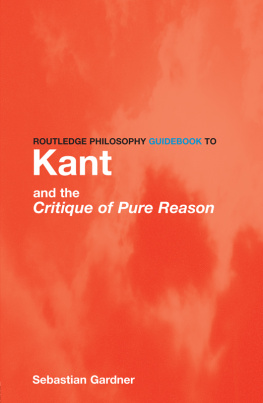
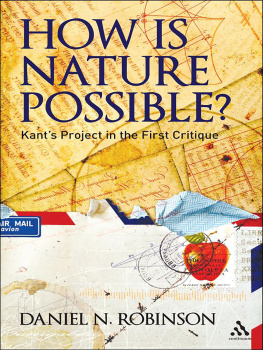

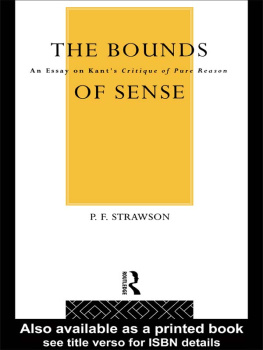
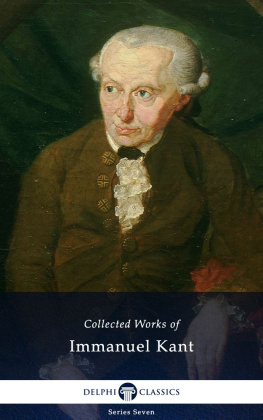
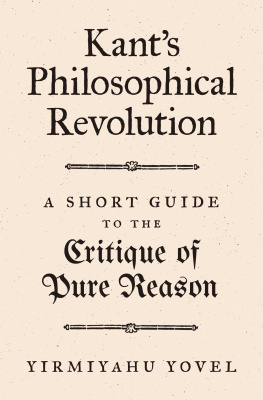
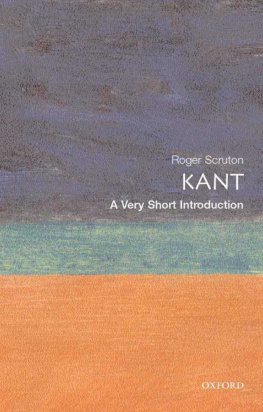
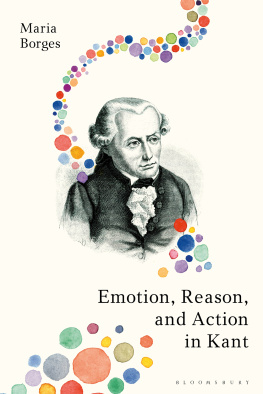
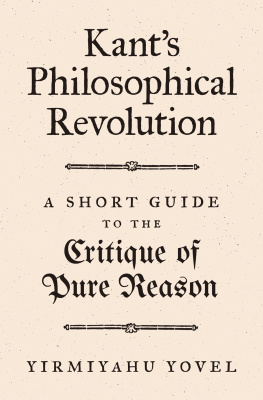
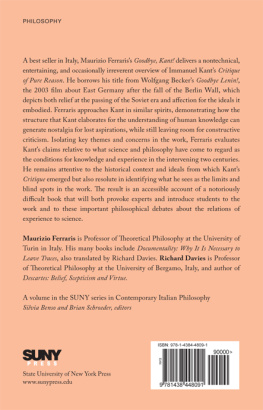
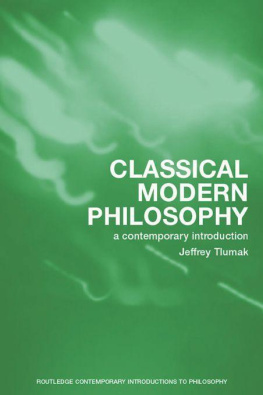


 Sebastian Gardner
Sebastian Gardner